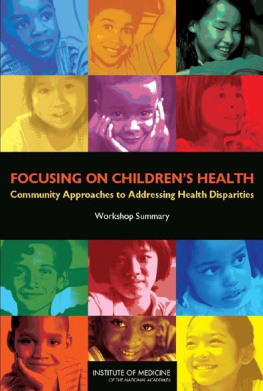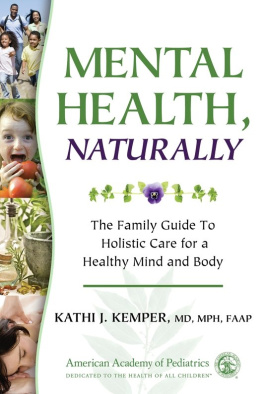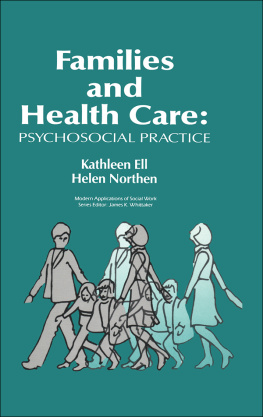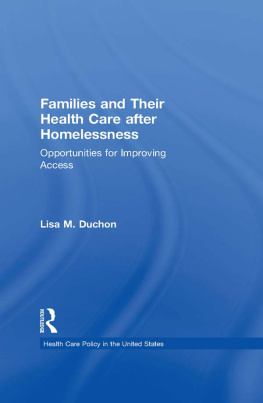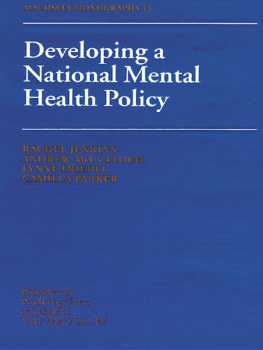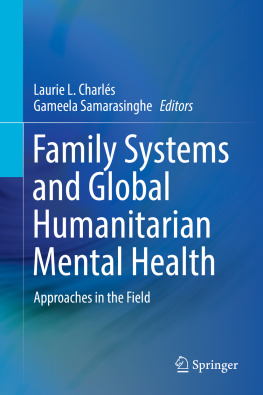Contemporary Family Perspectives
Series Editor
Susan J. Ferguson
Grinnell College
Volumes in the Series
Families: A Social Class Perspective
Shirley A. Hill
Making Families Through Adoption
Nancy E. Riley and Krista E. Van Vleet
Global Families
Meg Wilkes Karraker
Family Policy and the American Safety Net
Janet Zollinger Giele
The Work-Family Interface
Stephen Sweet
Gay and Lesbian Families
Nancy J. Mezey
FOR INFORMATION:
SAGE Publications, Inc.
2455 Teller Road
Thousand Oaks, California 91320
E-mail:
SAGE Publications Ltd.
1 Olivers Yard
55 City Road
London, EC1Y 1SP
United Kingdom
SAGE Publications India Pvt. Ltd.
B 1/I 1 Mohan Cooperative Industrial Area
Mathura Road, New Delhi 110 044
India
SAGE Publications Asia-Pacific Pte. Ltd.
3 Church Street
#1004 Samsung Hub
Singapore 049483
Acquisitions Editor: David Repetto
Editorial Assistant: Lauren Johnson
Production Editor: Eric Garner
Copy Editor: Diane DiMura
Typesetter: Hurix Systems Pvt. Ltd.
Proofreader: Joyce Li
Indexer: Wendy Allex
Cover Designer: Janet Kiesel
Marketing Manager: Eric DeLuca
Permissions Editor: Karen Ehrmann
Copyright 2014 by SAGE Publications, Inc.
All rights reserved. No part of this book may be reproduced or utilized in any form or by any means, electronic or mechanical, including photocopying, recording, or by any information storage and retrieval system, without permission in writing from the publisher.
Printed in the United States of America
A catalog record of this book is available from the Library of Congress.
978-1-4129-9893-2
This book is printed on acid-free paper.
13 14 15 16 17 10 9 8 7 6 5 4 3 2 1
Series Preface
Contemporary Family Perspectives
Susan J. Ferguson
Grinnell College
T he family is one of the most private and pervasive social institutions in U.S. society. At the same time, public discussions and debates about the institution of the family persist. Some scholars and public figures claim that the family is declining or dying, or that the contemporary family is in crisis or morally deficient. Other scholars argue that the family has been caught in the larger culture wars taking place in the United States. The current debates on legalizing same-sex marriage are one example of this larger public discussion about the institution of the family. Regardless of ones perspective that the family is declining or caught in broader political struggles, scholars agree that the institution has undergone dramatic transformations in recent decades. U.S. demographic data reveal that fewer people are married, divorce rates remain high, at almost 50%, and more families are living in poverty. In addition, people are creating new kinds of families via Internet dating, cohabitation, single-parent adoption, committed couples living apart, donor insemination, and polyamorous relationships. The demographic data and ethnographic research on new family forms require that family scholars pay attention to a variety of family structures, processes, ideologies, and social norms. In particular, scholars need to address important questions about the family, such as, what is the future of marriage? Is divorce harmful to individuals, to the institution of the family, and/or to society? Why are rates of family violence so high? Are we living in a post-dating culture? How do poverty and welfare policies affect families? How is child rearing changing now that so many parents work outside the home and children spend time with caretakers other than their parents? Finally, how are families socially constructed in various societies and cultures?
Most sociologists and family scholars agree that the family is a dynamic social institution that is continually changing as other social structures and individuals in society change. The family also is a social construction with complex and shifting age, gender, race, and social class meanings. Many excellent studies are currently investigating the changing structures of the institution of the family and the lived experiences and meanings of families. Contemporary Family Perspectives is a series of short texts and research monographs that provides a forum for the best of this burgeoning scholarship. The series aims to recognize the diversity of families that exist in the United States and globally. A second goal is for the series to better inform pedagogy and future family scholarship about this diversity of families. The series also seeks to connect family scholarship to a broader audience beyond the classroom by informing the public and by ensuring that family studies remain central to contemporary policy debates and to social action. Each short text contains the most outstanding current scholarship on the family from a variety of disciplines, including sociology, demography, policy studies, social work, human development, and psychology. Moreover, each short text is authored by a leading family scholar or scholars who bring their unique disciplinary perspective to an understanding of contemporary families.
Contemporary Family Perspectives provides the most advanced scholarship and up-to-date findings on the family. Each volume contains a brief overview of significant scholarship on that family topic, including critical current debates or areas of scholarly disagreement. In addition to providing an assessment of the latest findings related to their family topic, authors also examine the family utilizing an intersectional framework of race-ethnicity, social class, gender, and sexuality. Much of the research is interdisciplinary with a number of theoretical frameworks and methodological approaches presented. Several of the family scholars also use a historical lens as well to ground their contemporary research. A particular strength of the series is that the short texts appeal to undergraduate students as well as to family scholars, but they also are written in a way that makes them accessible to a larger public.
About This Volume
Health issues affect families in numerous ways, from caring for individuals with chronic illnesses or loved ones who are aging, to families trying to figure out how to economically meet the high costs of health care in the United States. This volume on Families and Health, describes the multidimensional nature of health issues and the various ways health issues can affect families and how families can affect the health status of individuals. The author, Janet Grochowski, is a family studies professor who became the Endowed Professor of Education and Department Chair at the College of St. Benedict and St. Johns University. In this second edition, Grochowski updates and expands her earlier arguments concerning families and health. Specifically, after defining a number of determinants of family health and examining some current health issues for families in the United States, Grochowski develops an interdisciplinary model for understanding the complex relationships between health and families. In the sections that follow, Grochowski closely examines a number of the variables that affect health, beginning with biological factors such as family health history and genetics. She then turns her attention to family decision making and behavioral patterns that affect health outcomes. Next, Grochowski examines social-economic circumstances, such as poverty, that create family health disparities and inequalities. Grochowski broadens her lens even further to investigate how the environment both locally and globally is affecting family health. She also discusses the need for changes in public policies and services to ensure that more American families get the health care information and coverage that they need.


